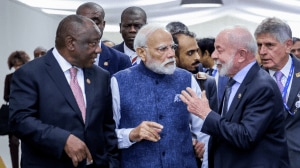Retail: The sting in the tale
The nuclear deal is just one of the things over which the UPA Government and Left don’t see eye to eye. Another is the opening up of the retail sector.

The nuclear deal is just one of the things over which the UPA Government and Left don’t see eye to eye. Another is the opening up of the retail sector. Even as Reliance, Birla and RPG group line up to open stores, they are meeting with protests at every step. Recently Mayawati shut down Reliance’s outlets in Uttar Pradesh while the company has put on hold its plans in West Bengal, despite assurances from the Buddhadeb Bhattacharjee Government. The heat generated over the issue is understandable given that the total turnover of the retail industry in the country — organised and unorganised — is Rs 11,67,240 crore, most of it (63 per cent) involving food and grocery. Of this, less than 4 per cent is in the organised side. While modern retailing is growing at 27 per cent compound annual growth rate, clearly there is a huge pie out there waiting to be carved. Smita Aggarwal explains:
• Who are the biggest players in the organised retail sector?
Some of the major private players are the Future Group with its flagship Big Bazaar stores, RPG group (Spencer’s), Subhiksha, and Piramyd Retail (TruMart). However, the biggest investments in modern retailing are coming from Reliance Retail Ltd and Aditya Birla Retail to the tune of Rs 25,000 crore and Rs 15,000 crore respectively.
While Bharti too has entered into a joint venture with global giant Walmart, this is limited to wholesale cash-n-carry operations, which translate primarily into B2B outlets catering to traders, wholesalers, small shops and big retailers. Currently, FDI norms in India restrict multi-brand retailing by foreign companies and allow 100 per cent FDI only in wholesale cash-n-carry and back-end operations. For single-brand retailing, FDI up to 51 per cent is allowed with prior government approval.
• What has triggered protests against Reliance Retail stores?
The latest controversy surrounds the opening of Reliance Retail’s supermarket store, Reliance Fresh, at two places in Kolkata, triggering protests on August 18 and August 26. The protesters alleged that the stores would wean away the livelihood of small traders, fruit and vegetable vendors.
The launch of Reliance Fresh stores is a part of the group’s Rs 2,000 crore agro-retail project in West Bengal, including its plans to launch hyper/super-markets, convenience stores, entertainment parks, multiplexes and six national distribution-cum-processing centres (NDCs) in Asansol, Haldia, Kharagpur, Kolkata, Malda and Siliguri.
• Where else have Reliance Retail stores faced protests?
After some protests in Uttar Pradesh, Chief Minister Mayawati ordered the closure of all Reliance Fresh and Spencer’s stores in the state on August 22 citing a law and order problem. The stores faced a similar assault in Kerala, leading to the state Government banning the entry of the retailer saying it wanted to protect 14,000 state-run stores and ration shops where essential commodities are sold at subsidised rates to the poor.
• Will the protests be able to hold back the big retailers?
The UP Government has constituted a committee under the Cabinet Secretary to look into hygiene and health aspects in addition to law and order problems posed by the entry of modern retailers. The panel is slated to submit its report within a month. Also, the Mayawati Government has rolled back the new agriculture policy, passed by the Cabinet earlier on August 3, that allowed contract-farming. It seems unlikely that state governments will be able to halt entry of retailers for long as there is no specific law banning entrepreneurial activities.
• How can modern retailers overcome the allegations/ protests?
For this, state laws have to be brought in line with a draft model legislation formulated by the Central Government — the Agricultural Produce Marketing (Development & Regulation Act, 2003) i.e. APMC Model Act. The model act provides for establishment of private markets/ yards, direct purchase centres, consumer/farmer markets for direct sale and promotion of Public-Private Partnership in the management and development of agricultural markets in the country. The model act includes legislation to regulate and promote contract-farming arrangements in the country. While some states like Bihar have completely repealed the existing State APMC act to bring in this model act, other states like Maharashtra and Rajasthan are still to notify the rules after amendment.
• Can modern retailing benefit farmers?
Modern retailers have been advocating direct procurement from farmers, giving them better prices for their goods, cutting intermediary costs and passing on the benefits to the consumer in the form of cheaper goods. It’s only after the states amend the existing laws that the modern retailers can hope to introduce direct procurement apart from making direct investments in agriculture in the form of contract-farming.
• Is organised retailing beneficial for Indian economy?
If industry estimates are taken into account, modern retailing is providing a major boost to employment figures and is slated to create two million additional jobs by 2010. Due to lack of cold chain facilities, 35 per cent of perishable commodities go waste. This is bound to change once efficient cold storage chains are put in place and private players invest in supply chain and back-end operations. Even though modern retail is growing, experts do not see a share bigger than 15-20 per cent of total retail in the next 10 years. Ultimately, the consumer will be the king, with a host of options —- whether to rush to the street vendor or to visit the neighbourhood store a kilometre from his house.








- 01
- 02
- 03
- 04
- 05























